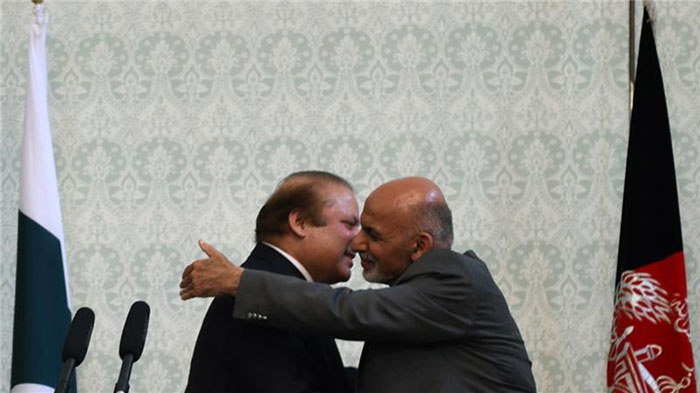Afghan government is sleeping with the enemy

By:Aimal Faizi, Afghan journalist and former spokesperson for former Afghan President Hamid Karzai from 2011-2014.
The inking of an intelligence cooperation accord between Afghanistan and Pakistan has raised growing voices of concern at all levels in Afghanistan.
Afghanistan's National Directorate of Security (NDS) and Pakistan's Inter-Services Intelligence (ISI) have signed a memorandum of understanding which - according to the Afghan Presidential Palace - is aimed "mostly [at] jointly fighting terrorism".
Expressing his deep concerns about the signing of the agreement, former Afghan President Hamid Karzai in a statement called on the government to "immediately cancel" the MoU. It is said that the current and former presidents had a "very tense" telephone conversation on this issue on Wednesday.
The Afghan National Unity Government's naive overture towards Islamabad seems to be gradually subduing Afghanistan to Pakistan. Under the name of bilateral intelligence cooperations, the signed MoU will allow Pakistan's ISI to penetrate deep into a key Afghan security establishment and undermine the country's sovereignty. It is against Afghanistan's national interests.
My enemy's enemy?
Rejected by Kabul, Afghan and Pakistani media reports suggest that in accordance with the agreement, the ISI will "equip the NDS and train its personnel".
Afghan media reports reveal that based on the agreement, the two spy agencies will "jointly fight separatism" and "enemy espionage agencies". The agreement will also allow Pakistan intelligence agencies to probe the terrorist suspects under Afghan detention. It is also said that the MoU has articles on "moulding public opinion and narrative" about Pakistan in Afghanistan.
The signed accord is now raising questions such as; which "enemy" intelligence agency is the Afghan NDS supposed to jointly counter with Pakistan's ISI? Who is our joint enemy? Who are the terrorists? What is the mutually agreed definition of terrorism and terrorists in the signed agreement? And which separatism and separatist groups do the two spy agencies have to fight?
Afghanistan and Pakistan do not have a mutual "enemy intelligence agency" to fight together. Since the fall of the Taliban regime, the Afghan intelligence establishment has been countering ISI's covert activities in Afghanistan.
For over a decade, Afghan security forces are fighting an imposed war with Pakistan's deep-state's "strategic assets" such as the Taliban, the Haqqani Network and Lashkar-e-Taiba. All the terrorist groups committing violence in Afghanistan on a daily basis by killing innocent Afghans are believed to have their safe-havens in Pakistan and enjoy unbridled support of the host country's army and intelligence agencies.
Speaking to the upper house of the Afghan parliament recently, the Afghan national security advisor said terrorist hideouts located in Pakistan still pose a "serious threat" to Afghanistan's peace and stability and "our main demand" from Pakistan is to eliminate them.
If Pakistan's interpretation of the term "enemy intelligence agencies" is India, it must accept that India is Afghanistan's friend and ally.
Pakistan's self-destructive policies
There is no doubt that Pakistan also suffers from a dramatic rise in terrorism. Innocent Pakistanis are getting killed in terrorist attacks in different parts of the country every day.
Pakistan's leadership must come to the realisation that the spread of terrorism on its soil is the direct consequence of the state's self-destructive policies of using terrorism and radicalism as tools. Islamabad must step away from its narrative of denial. Pakistan's reliance on radical terrorist groups is fuelling terrorism both in Afghanistan and Pakistan.
The element of "joint fight against separatism and separatist groups" in the signed MoU is the most worrying part of the agreement. Afghanistan is a united country and there is no Afghan separatist group in and outside the country. In contrast, since its creation, Pakistan has separatist movements on its soil and they are practically at war against Pakistan.
Separatist movements of Pakistan have nothing to do with Afghanistan, nor is their existence in Baluchistan, Sindh, Waziristan and other parts a new phenomena in Pakistan. Under the banner of jointly fighting "separatism and separatist movements", Pakistan's intelligence agency has a hidden strategy, which could be very hazardous for Afghanistan.
What is to be done?
The Afghan government's policy of appeasement towards Islamabad is a one-sided concession to Pakistan's military establishment. The Afghan government has also agreed to the training of Afghan police by Pakistan. It is allowing Pakistan to worm its way into Afghan security and defense establishments.
During his visit to Kabul, Prime Minister Nawaz Sharif announced that "capacity building of Afghan police will be done as already offered, including training". He also acknowledged that Pakistan will "further deepen" its "defense and security partnership" with Afghanistan.
Afghans see no visible change in Pakistan's double-sided policy towards Afghanistan nor in its dealing with terrorist groups. Condemning the signing of the agreement with Pakistan, Afghan MPs have already summoned senior security officials to a general session of the lower house of the Parliament.
The head of the Afghan National Directorate of Security, Rahmatullah Nabil, has already expressed his disagreement to the ARG (Afghan Presidential Palace) and resisted the signing of the accord.
It is imperative for the Afghan government to immediately cancel the MoU with Pakistan before the issue leads to a national outcry.
Source: Al-Jazeera

